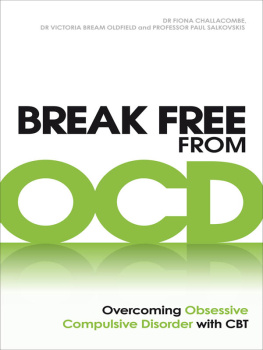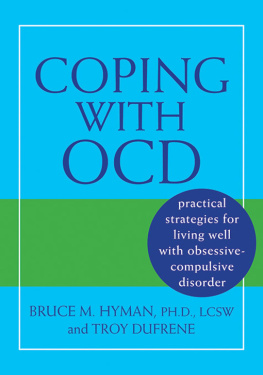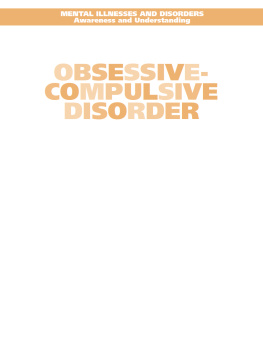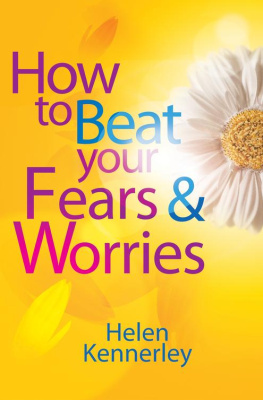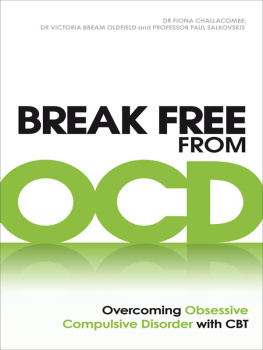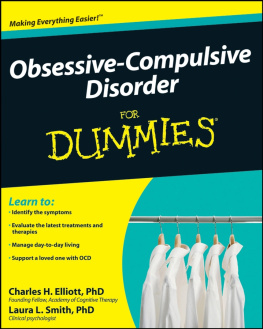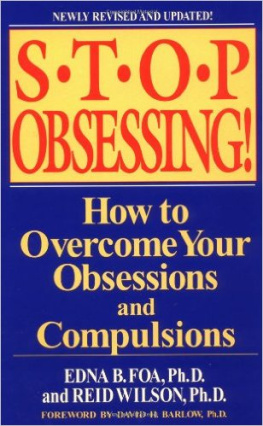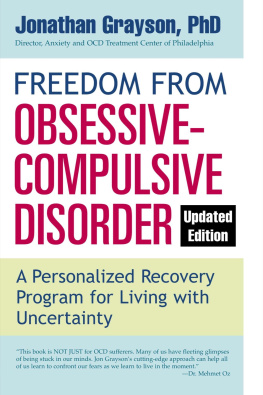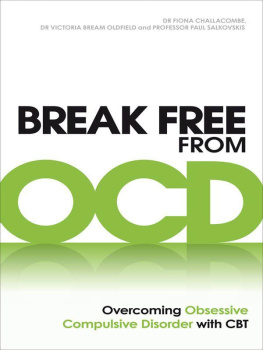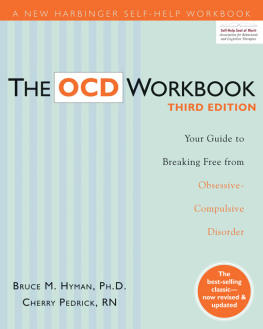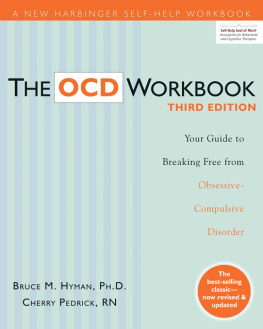About the Book
Are you worried by obsessive thoughts, rituals or routines?
Would you like regain control over your behaviour and cast your fears aside?
Whether you are compelled to clean more and more thoroughly, are plagued by bad thoughts or feel the need to keep checking youve turned off appliances, obsessive worries can become a drain on daily life. However, you dont need to suffer any more. This practical guide, written by three leading cognitive behavioural therapy (CBT) experts, enables you to make sense of your symptoms, and gives a clear plan to help you conquer OCD.
Includes:
- Detailed information on the main types of OCD, including rumination OCD
- Clear, step-by-step information on treating your individual problem using CBT
- True-to-life case studies and examples
- Advice and support for friends and family of OCD sufferers
- How to keep OCD out of your life now and in the future
Whether your condition is mild or severe, this definitive resource will help you reclaim your life and keep OCD away for good.
This ebook is copyright material and must not be copied, reproduced, transferred, distributed, leased, licensed or publicly performed or used in any way except as specifically permitted in writing by the publishers, as allowed under the terms and conditions under which it was purchased or as strictly permitted by applicable copyright law. Any unauthorised distribution or use of this text may be a direct infringement of the authors and publishers rights and those responsible may be liable in law accordingly.
Version 1.0
Epub ISBN 9781446491843
www.randomhouse.co.uk
1 3 5 7 9 10 8 6 4 2
Published in 2011 by Vermilion, an imprint of Ebury Publishing Ebury
Publishing is a Random House Group company
Copyright Dr Fiona Challacombe, Dr Victoria Bream Oldfield
and Professor Paul Salkovskis 2011
Illustrations copyright Stephen Dew 2011
Dr Fiona Challacombe, Dr Victoria Bream Oldfield and Professor Paul Salkovskis have asserted their right to be identified as the authors of this work in accordance with the Copyright, Designs and Patents Act 1988.
All rights reserved. No part of this publication may be reproduced, stored in a retrieval system, or transmitted in any form or by any means, electronic, mechanical, photocopying, recording or otherwise, without the prior permission of the copyright owner.
The Random House Group Limited Reg. No. 954009
Addresses for companies within the Random House Group can be found at www.randomhouse.co.uk
A CIP catalogue record for this book is available from the British Library
ISBN 9780091939694
To buy books by your favourite authors and register for offers, visit www.rbooks.co.uk
The information in this book has been compiled by way of general guidance in relation to the specific subjects addressed, but is not a substitute and not to be relied on for medical, healthcare, pharmaceutical or other professional advice on specific circumstances and in specific locations. Please consult your GP before changing, stopping or starting any medical treatment. So far as the authors are aware the information given is correct and up to date as at May 2011. Practice, laws and regulations all change, and the reader should obtain up-to-date professional advice on any such issues. The authors and publishers disclaim, as far as the law allows, any liability arising directly or indirectly from the use, or misuse, of the information contained in this book.
The case studies in this book are not from one person, but a compendium of elements from the authors experience of people with OCD.
CONTENTS
To Isabella, Seraphina, Cora and Duncan
About the Authors
Dr Fiona Challacombe MA (Cantab), DClinPsy, CPsychol, MBPS is a research fellow and clinical psychologist working at Kings College London and the Centre for Anxiety Disorders and Trauma at the Maudsley Hospital, London. She is part of a national specialist service treating individuals with severe and complex OCD. Her research focuses on the impact of OCD on parenting and families, and investigating the delivery and refinement of cognitive behaviour therapy for OCD.
Dr Victoria Bream Oldfield MA (Oxon), DClinPsy, CPsychol, MBPS is a clinical psychologist working at the Centre for Anxiety Disorders and Trauma, Maudsley Hospital, London. She is part of a national specialist service treating individuals with severe and complex OCD. She studied experimental psychology at the University of Oxford, clinical psychology at the Institute of Psychiatry, Kings College London, and trained in Cognitive Behaviour Therapy at the Oxford Cognitive Therapy Centre at the University of Oxford. Her research interests are in the phenomenology and treatment of OCD.
Professor Paul Salkovskis BSc, MPhil (Clin Psy), PhD, CPsychol, FBPS is Professor of Clinical Psychology and Applied Science and Programme Director of the forthcoming Doctorate programme in Clinical Psychology at the University of Bath. He is editor of the scientific journal Behavioural and Cognitive Psychotherapy. He has published over 250 scientific papers and recently received the Aaron T Beck award for contributions to cognitive therapy.
ACKNOWLEDGEMENTS
We would like to thank all the people with OCD we have worked with over the years. The courage shown by those undertaking treatment and overcoming their difficulties continues to inspire us.
We would also like to thank our colleagues at the Centre for Anxiety Disorders and Trauma at the Maudsley Hospital, the University of Oxford and the Institute of Psychiatry, Kings College London.
HOW TO USE THIS BOOK
This book is a guide to self-help for people who already know or think they have obsessivecompulsive disorder (OCD). There are special sections aimed at friends and families who may want to read further into the book to gain knowledge of the problem and how to help (see ).
OCD can come in many forms if you have OCD we recommend reading about all the types of OCD described in this book. By gaining a really good understanding of how OCD works, you will get the best understanding of your own problems and how to beat them. We will move through thinking about the impact and the mechanics of the problem, and will use this information to help you both know how to and choose to change .
1
WHAT IS OBSESSIVECOMPULSIVE DISORDER?
IN THIS CHAPTER we will cover:
- The main features of obsessivecompulsive disorder
- Why it is normal to have intrusive thoughts and how it is unhelpful to try to control them
- Why obsessivecompulsive disorder becomes a problem for some people
- Introduction to the cognitive behavioural understanding of obsessivecompulsive disorder
Have you ever gone back to check that the gas is off, or thought that something is invisibly dirty or contaminated and taken extra care to clean it, or even thrown it away? Do you feel uncomfortable if your things arent arranged in a very particular way? Have you ever had a thought that you might do something terrible and out of character? Have you had a thought or mental picture about something you think you should never think about? Ever noticed what seemed like an impulse to do something you dont really want to? Or had a bad thought that you needed to cancel out in some way? These are all intrusive thoughts, meaning thoughts which pop into your head and interrupt what you are already thinking they intrude! If they intrude so often and so strongly that they severely interfere with what you want to do, then you can be said to be suffering from obsessions and compulsions as a disorder: obsessivecompulsive disorder.

